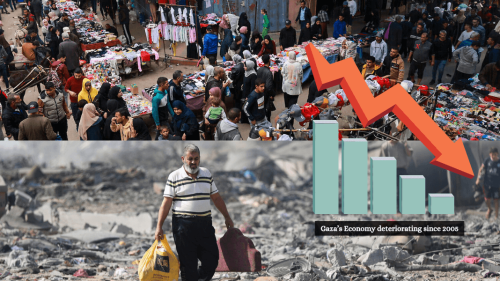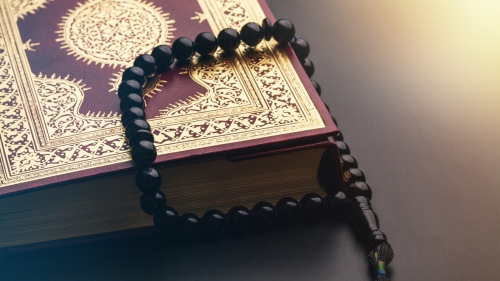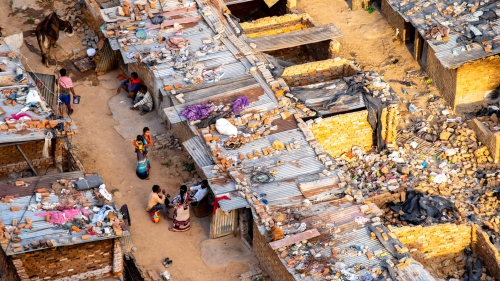Islamic financial revolution

In the midst of concerns about the Islamist threat, a quieter revolution is going on in Islam which could ultimately lead to a new economic bloc in the world. Since the 1970s, an economic theory has been taking hold in a number of Muslim countries, backed by a growing Islamic financial system.
Historically, like Judaism and Christianity, Islam forbade usury and advocated "economic" laws. There are scant references in the Koran, which could be used to defend any number of economic policies, but they have been seen as prescriptive enough to merit a complete Islamic economic theory.
The practical outcome is the creation of Islamic banks, with funds currently totaling some $250 billion and growing at 15 percent per annum, with the potential to reach $1 trillion easily within ten years. Initially, this was fueled by wealthy Muslims, corporations and foreign banks seeing this as a niche market. There is a certain irony in this, because Islamic economic theory places socioeconomic justice at the center of its response.
However, the aim goes further than allowing finance houses to provide services to the faithful in a growing niche market. Pakistan and Sudan have Islamized their economic policy, while Malaysia has supported a hybrid system between a market-based economy and an Islamic financing system. There is a statist aim of hijacking Islamic financing in certain countries and propagating policies to encourage an alternative market order, namely an Islamic one. What would such an order offer?
Simply stated, it rejects both the market economy and socialism, offering a system based on an Islamic worldview. Muslim economists argue that capitalism fails because it reflects a lack of contentment, illustrated by our single minded pursuit of wealth, rampant consumerism and preoccupation with sensual pleasure. They say socialism fails because it lacks harmony between its goals and its worldview, which is rooted in post-Enlightenment secular philosophy. It is also dogged by what one Muslim economist called the "Americanization of the left," yet offered in its place is an Islamization of the left.
The solution propagated is a reallocation of resources and redistribution of wealth, fulfilling a Muslim's moral obligation to be a worthy example. Such Islamization of the economy aspires to spiritual as well as material well-being, thus establishing socioeconomic justice. This means an economy according to a divine mandate giving humanity stewardship of the earth's resources, refined through a "moral filter" before being made subject to the discipline of the market.
However distant the prospect at present, this is a radical alternative economic system which has found a home in Islam, prescribing an holistic organization of society as an economic system. It is potentially a powerful vision, just as Communism and socialism were.
The attack on September 11 by al Qaeda and its attempt to destabilize U.S. economic power is akin to that of the Bolsheviks' assault on the Winter Palace, which led to the Soviet Union and an economic system tyrannizing a large part of the world for much of the last century. It may only be a matter of time before a powerful state based on Islamic economic teachings creates a new iron curtain, or iron veil.
This provides a new direction for the Islamists on the one hand, and, on the other, market economy critics may see this as proof that there are economic alternatives. With only one economic order today, a vacuum exists for those opposed to the market economy, and critics are just waiting to give house room to any alternative since the fall of Communism. In some respects, it is the latter group that we need worry about more, since they will take on board the socialism inherent in much of this Islamic economic argument, while failing to understand the theological basis.
As in socialism, Islamic economists fail to establish how the injustices in the existing world order are avoided in their system, or how redistribution of wealth would be fairer. The theological problem is that Islam, like Judaism and Christianity, takes issue with how we live our lives responsibly in the modern economic world. The latter two religions have long since accepted that one cannot take prescriptively an economic theory from sacred texts, and Islam ought to follow suit.
The political problem is that for Islamization of the economy to be successful as an alternative one would have to accept an Islamist worldview - in other words submit to Islam. We may well be on the edge of a new economic revolution, or will this be seen for what it really is: Socialism in religious dress?
David Cowan, who earned a degree in theology from Oxford University, taught Islam and religion theory at Cambridge England's Lutheran Seminary.
Source: Washington Times
Related Suggestions
So here is my second post on this article. I agree with Zahir post.
The whole current "Islamic Banking System" is flawed in the first place as it has Riba within the system. Exchanging money for money and making a profit is haram. Also the current whole world financial system is flawed: it is based on Fiat Paper money. Ok this is what I mean: here in the UK, the money has the line printed on it "I demand to pay the bearer the sum of ..." Then the sum is written i.e "..Sum of Five Pounds". Have you ever tried to collect that sum from a bank cashier? LOL! It is a promise that is never meant to be carried out; the current world wealth is in the hands of a few, those few who control Land, Gold, Silver and any other precious assets.
The world finance system is an exponential system that will eventually collapse under its own wait. It is bound to happen.
This writer's prejudice and bias shows throughout this article. He is jealous that Islam does offer an economic system and is concerned that Muslims may yet go back to it to liberate themselves from the clutches of the exploitative capitalism that grips the world today. His solution to the first problem is denial from which flows this condescending remark: "The latter two religions have long since accepted that one cannot take prescriptively an economic theory from sacred texts, and Islam ought to follow suit."
His solution to the second problem is to issue yet another alert about the "danger" posed by Islam. And that is the main purpose of this article.
The sad truth is that the world gets poorer with every passing day under capitalism, as the obscene disparity between the rich and the poor grows. The world badly yearns for a solution. And Islam offers that solution. Islamic solution consists in justice, morality, economic responsibility, fear of God and a rejection of both hedonism and exploitation. And this "man of God" is so solidly against all that. One wonders what they teach at the college of theology at Oxford.
First: Islam still (not historically) forbids usury and this is non-negotiable as it is clearly (not scantly) stated by Allah (swt) in the Qur'an (2:274).
Second: No country has "Islamicized" their economic policy unless they have removed usury and the use of paper money (which is haraam. This is how economic justice is achieved.
Thirdly: The reason all of these other systems fail (capitalism, communism, etc.) is because they were created by the kafir and not mandated by Allah(swt).
In Summary: When will our ummah follow the beautiful path mapped out for us by our Creator instead of searching for solutions created by humanists and atheists???
The Europoeans' failed experiment of incorporating Christianity and Judaism in Economic system is irrelevent here. Cowan's mentioning of Islamic economy as "Socialism in religious dress?" is also irrelevant. Because unlike Christianity or Judaism (in their present form) Islam is a social and political religion from day one. It encompasses every dimension of life without necessarily theologizing it. This is a fact that the students of Divinity from Western schools find most difficult to grasp.In Islam, there is absolutely no room for theologizing. The Qur'an is simple and crystal clear, but robust in its applications.
No economy can solve all problems. Nor can Islamic economy. In Islam, it is clear that Allah gives wealth whomever He wants. Nations go up and nations go down. And every nation ends up when their due time comes. Islamic economy stands on such a practical stance and not on some utopic ideology challenging Western economy.

















